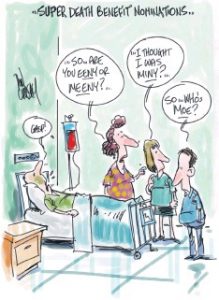The critical objective of estate planning is to ensure that the right people get your assets after you pass away. Traditionally this is done via a Will; however, it is now common for a third or more of a family’s wealth to be in superannuation, which is not automatically covered by your will.
Most people are often unaware that they have made, or should make, a super death benefit (DBN) directing their super fund on how to pay their super after their death.
When you set up or join a super fund, one of the many forms you complete often says in effect: “My spouse/child gets my super when I die” – the most basic kind of DBN available. That’s it…but what happens if, for example:
- your spouse does not survive you,
- a child has special needs, is not responsible with money or has large debts,
- a child does not survive you, leaving children of their own,
- you want to leave out a child due to their bad behaviour towards you, or
- you divorce or separate before you make a new DBN?
Most people provide for these possibilities in their will (or the law covers them automatically), yet they commonly overlook them when deciding what happens to their super after their death.
Dealing with your super in your will
 In many cases, it will not be appropriate to deal with your super under your will. It is often better for your surviving spouse, and/or minor children, to receive your death benefits via a pension, bypassing your will entirely. This is best achieved by making a binding death benefit nomination specifying that this should occur.
In many cases, it will not be appropriate to deal with your super under your will. It is often better for your surviving spouse, and/or minor children, to receive your death benefits via a pension, bypassing your will entirely. This is best achieved by making a binding death benefit nomination specifying that this should occur.
In some cases, however, a death benefit pension will not be appropriate, or may even be prohibited by law: for example, if you are the surviving member of a couple and your children are over 25. In such cases, it is often preferable to deal with superannuation under your will.
 A well-drafted will should specify how super death benefits are divided up if they are paid to your executor. This, of itself, does not guarantee that your super will be dealt with under your will. This kind of will clause is only guaranteed to work if you make a binding DBN requiring your super fund trustee to pay your super death benefits to your executor on your death. (If you have not given a binding DBN your super trustee may still decide to pay your death benefits in this way, but there is no guarantee that it will do so.)
A well-drafted will should specify how super death benefits are divided up if they are paid to your executor. This, of itself, does not guarantee that your super will be dealt with under your will. This kind of will clause is only guaranteed to work if you make a binding DBN requiring your super fund trustee to pay your super death benefits to your executor on your death. (If you have not given a binding DBN your super trustee may still decide to pay your death benefits in this way, but there is no guarantee that it will do so.)
A correctly drawn binding DBN will ensure that your death benefits are dealt with in the best way from among the above alternatives, depending on which scenario occurs. A proper DBN may, for example, specify that if your spouse survives they receive a pension, but if you are survived only by adult children your super goes to the executor of your will.
Taxation of super death benefits
Non-superannuation assets are inherited tax-free (although they may be subject to capital gains tax on eventual sale). Super death benefits, however, may or may not be tax-free in the hands of your beneficiaries, depending on their ages and relationships to you.
 Super death benefits receive more favourable tax treatment (which can be a nil tax rate) if they are paid to a “Dependant” (as defined in the Income Tax Assessment Act) depending on their age. A Dependant, in this sense, is a surviving spouse, a child under 18, a child over 18 who was financially dependent on you, or a person with whom you were in an “inter-dependency” relationship.
Super death benefits receive more favourable tax treatment (which can be a nil tax rate) if they are paid to a “Dependant” (as defined in the Income Tax Assessment Act) depending on their age. A Dependant, in this sense, is a surviving spouse, a child under 18, a child over 18 who was financially dependent on you, or a person with whom you were in an “inter-dependency” relationship.
In some cases, these differences may mean that to minimise the overall tax burden on your super death benefit and none (or less) of your non-super assets, and vice versa for a non-dependant beneficiary. Your loved ones can still receive the same amount each in dollar terms, but the source of their shares (from super and non-super assets) may be different.
Some super funds limit DBN choices
Some public and industry super funds only allow non-binding DBNs. These guide the super fund on how to pay your death benefits but, as the name suggests, the fund is not legally bound to follow them. Other public or industry funds permit binding DBNs; however, these must be renewed every three years by law, otherwise they become non-binding.
 Further, many super funds deny members the ability to make a DBN which provides for various alternative scenarios which may occur. This will require you to keep your DBN under more frequent review, to ensure it is updated to address any changes in your family circumstances. A will, however, can predict and deal with a greater range of common possibilities in advance, although these too require periodic review.
Further, many super funds deny members the ability to make a DBN which provides for various alternative scenarios which may occur. This will require you to keep your DBN under more frequent review, to ensure it is updated to address any changes in your family circumstances. A will, however, can predict and deal with a greater range of common possibilities in advance, although these too require periodic review.
A Self-Managed Super Fund (SMSF) gives you maximum freedom to make the kind of DBN that is best for your circumstances. If your SMSF deed is worded correctly (and it can usually be amended if it isn’t), you can make a binding DBN which only expires if you change it, giving you the same flexibility to deal with super as you have when leaving assets under a will.
In certain cases (e.g. you wish to disinherit a child, or implement a detailed estate-planning strategy) and you have a public super fund which does not allow binding DBNs, you may need to move your super to an SMSF to eliminate the chances of an undeserving beneficiary convincing the trustee to grant them a share, or your wishes otherwise not being properly carried out.
Conclusion
 As death benefits are a complex area, you should work with your financial planner and your lawyer together to ensure that the best advice is given, and you have a consistent estate plan for all your asset classes, documented correctly.
As death benefits are a complex area, you should work with your financial planner and your lawyer together to ensure that the best advice is given, and you have a consistent estate plan for all your asset classes, documented correctly.
If you are unsure if you have the necessary DBN’s in place, or that your Will adequately deals with all your assets after death, feel free to contact us and we can assist you in ensuring that all your documents are in order.



